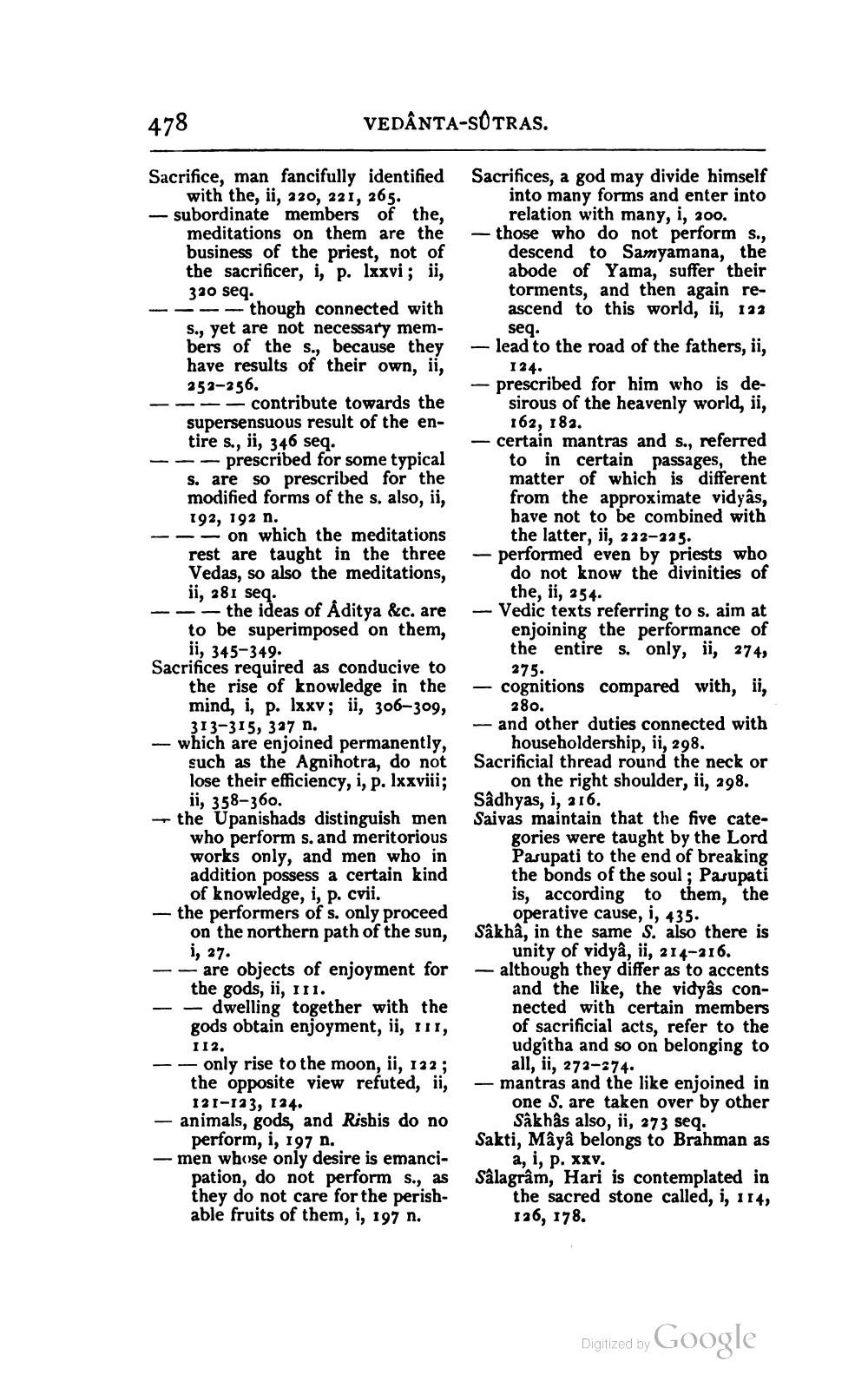________________
478
VEDÂNTA-SOTRAS.
Sacrifice, man fancifully identified
with the, ii, 220, 221, 265. - subordinate members of the,
meditations on them are the business of the priest, not of the sacrificer, i, p. lxxvi; ii, 320 seq. --- though connected with S., yet are not necessary members of the s., because they have results of their own, ii, 253–256. --- contribute towards the supersensuous result of the entire s., ii, 346 seq. -- prescribed for some typical S. are so prescribed for the modified forms of the s. also, ii,
192, 192 n. -- on which the meditations rest are taught in the three Vedas, so also the meditations,
ii, 281 seq. --- the ideas of Aditya &c. are
to be superimposed on them,
ii, 345-349. Sacrifices required as conducive to
the rise of knowledge in the mind, i, p. lxxv; ii, 306,309,
313-315, 327 n. - which are enjoined permanently,
such as the Agnihotra, do not lose their efficiency, i, p. lxxviii;
ii, 358-360. - the Upanishads distinguish men
who perform s.and meritorious works only, and men who in addition possess a certain kind
of knowledge, i, p. cvii. - the performers of s. only proceed
on the northern path of the sun,
i, 27. -- are objects of enjoyment for
the gods, ii, 111. - - dwelling together with the
gods obtain enjoyment, ii, IT, I12. - only rise to the moon, ii, 122; the opposite view refuted, ii,
121-123, 124. - animals, gods, and Rishis do no
perform, i, 197 n. - men whose only desire is emanci
pation, do not perform s., as they do not care for the perishable fruits of them, i, 197 n.
Sacrifices, a god may divide himself
into many forms and enter into
relation with many, i, 200. those who do not perform s.,
descend to Samyamana, the abode of Yama, suffer their torments, and then again reascend to this world, ii, 123 seq. lead to the road of the fathers, ii,
124. prescribed for him who is desirous of the heavenly world, ii,
162, 182. certain mantras and s., referred
to in certain passages, the matter of which is different from the approximate vidyâs, have not to be combined with
the latter, ii, 222-225. - performed even by priests who
do not know the divinities of
the, ii, 254. - Vedic texts referring to s. aim at
enjoining the performance of the entire s. only, ii, 274,
275 - cognitions compared with, ii,
280. - and other duties connected with
householdership, ii, 298. Sacrificial thread round the neck or
on the right shoulder, ii, 298. Sâdhyas, i, 216. Saivas maintain that the five cate
gories were taught by the Lord Pasupati to the end of breaking the bonds of the soul; Pasupati is, according to them, the
operative cause, i, 435. Sakhâ, in the same S. also there is
unity of vidyâ, ii, 214-316. - although they differ as to accents
and the like, the vidyâs connected with certain members of sacrificial acts, refer to the udgitha and so on belonging to
all, ii, 272-274. - mantras and the like enjoined in
one S. are taken over by other
Sakhâs also, ii, 273 seq. Sakti, Mâyâ belongs to Brahman as
a, i, p. xxv. Sâlagrâm, Hari is contemplated in
the sacred stone called, i, 114, 126, 178.
Digitized by
Digized by Google




